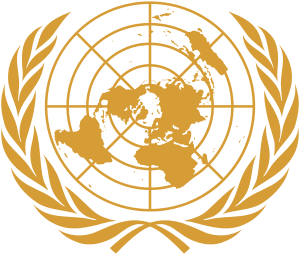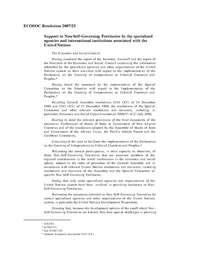United Nations Economic and Social Council
| Conseil économique et social des Nations unies | |
 | |
|
The room of the United Nations Economic and Social Council. UN headquarters, New York City, New York, U.S. | |
| Abbreviation |
ECOSOC CESNU |
|---|---|
| Formation | 1945 |
| Type | Primary organ |
| Legal status | Active |
Head |
President of the ECOSOC Frederick Musiiwa Makamure Shava[1] |
| Website | www.un.org/en/ecosoc |
The United Nations Economic and Social Council (ECOSOC; French: Conseil économique et social des Nations unies, CESNU) is one of the six principal organs of the United Nations, responsible for coordinating the economic, social, and related work of 15 UN specialised agencies, their functional commissions and five regional commissions. The ECOSOC has 54 members. It holds one four-week session each year in July, and since 1998, it has also held a meeting of April with finance ministers heading key committees of the World Bank and the International Monetary Fund (IMF).
The ECOSOC serves as the central forum for discussing international economic and social issues, and for formulating policy recommendations addressed to member states and the United Nations system.[2] A number of non-governmental organisations have been granted consultative status to the Council to participate in the work of the United Nations.
President
The president is elected for a one-year term and chosen from the small or mid-sized powers represented on the ECOSOC.[1] His Excellency Frederick Musiiwa Makamure Shava was elected seventy-second President of the Economic and Social Council on 28 July 2016. Ambassador Shava is currently the Ambassador and Permanent Representative of the Republic of Zimbabwe to the United Nations in New York.
| Term | President | From |
|---|---|---|
| 2016 | Mr. Frederick Musiiwa Makamure Shava | |
| 2015 | Mr. Oh Joon | |
| 2014 | Mr. Martin Sajdik | |
| 2013 | Mr. Néstor Osorio Londoño | |
| 2012 | Mr. Miloš Koterec | |
| 2011 | Mr. Lazarous Kapambwe | |
| 2010 | Mr. Hamidon Ali | |
| 2009 | Ms. Sylvie Lucas | |
| 2008 | Mr. Léo Mérorès | |
| 2007 | Mr. Dalius Čekuolis | |
| 2006 | Mr. Ali Hachani | |
| 2005 | Mr. Munir Akram | |
Members
The Council has 54 member states out of the 193 UN member states, which are elected by the United Nations General Assembly for overlapping three-year terms. Seats on the Council are based on geographical representation with 18 allocated to African states, 13 to Asian states, 8 to East European states, 13 to Latin American and Caribbean states and 13 to West European and other states.

Observer Inter-Governmental Autonomous organisations
Participation on a continuing basis:[3]
- African Regional Centre of Technology
- Asian and Pacific Development Centre
- Asian Productivity organisation
- Council of Arab Economic Unity
- Global Water Partnership
- Helsinki Commission
- Inter-American Institute for Cooperation on Agriculture
- Intergovernmental Forum on Mining, Minerals, Metals and Sustainable Development
- Intergovernmental Institution For the Use of Micro-Algae Spirulina Against Malnutrition
- International Association of Economic and Social Councils and Similar Institutions
- International Center for Public Enterprises in Developing Countries
- International Centre for Genetic Engineering and Biotechnology
- Islamic Educational, Scientific and Cultural organisation
- Latin American Energy organisation
- organisation of Ibero-American States
- organisation of the Petroleum Exporting Countries
- Regional organisation for the Protection of the Marine Environment
- Union des Conseils Économiques et Sociaux Africains
- Economic Community Of West African States
- World Deserts Foundation
- World Tourism organisation
Participation on an ad hoc basis:[3]
- African Accounting Council
- African Cultural Institute
- Arab Security Studies and Training Center
- Council of Arab Ministers of the Interior
- International Bauxite Association
- International Civil Defence Organisation
- Latin American Social Sciences Institute
Functional commissions
- UN Commission for Social Development
- UN Commission on Human Rights (UNCHR): disbanded 2006, replaced by the United Nations Human Rights Council (UNHRC), a subsidiary organ of the General Assembly
- Commission on Narcotic Drugs
- Commission on Crime Prevention and Criminal Justice
- Commission on Science and Technology for Development (CSTD)
- Commission on Sustainable Development (CSD) – Disbanded 2013, replaced with High-level Political Forum on Sustainable Development a joint subsidiary body of the General Assembly and ECOSOC
- UN Commission on the Status of Women (UN CSW)
- Commission on Population and Development
- UN Statistical Commission
- United Nations Forum on Forests
Regional commissions
- United Nations Economic Commission for Europe (ECE)
- United Nations Economic Commission for Africa (ECA)
- United Nations Economic Commission for Latin America and the Caribbean (ECLAC)
- United Nations Economic and Social Commission for Asia and the Pacific (ESCAP)
- United Nations Economic and Social Commission for Western Asia (ESCWA)
Specialised agencies
These specialised agencies are autonomous organisations working with the United Nations and each other inter alia through the coordinating machinery of the Economic and Social Council.
- International Labour organisation (ILO)
- Food and Agriculture organisation (FAO)
- United Nations Educational, Scientific and Cultural organisation (UNESCO)
- World Health organisation (WHO)
- World Bank Group
- International Monetary Fund (IMF)
- International Civil Aviation organisation (ICAO)
- International Maritime organisation (IMO)
- International Telecommunication Union (ITU)
- Universal Postal Union (UPU)
- World Meteorological organisation (WMO)
- World Intellectual Property organisation (WIPO)
- International Fund for Agricultural Development (IFAD)
- United Nations Children's Fund (UNICEF)
- United Nations High Commissioner for Refugees (UNHCR)
- United Nations Human Settlements Programme (UN Habitat)
- United Nations Industrial Development organisation (UNIDO)
- United Nations Development Programme (UNDP)
- United Nations Office of Project Services (UNOPS)
- International Narcotics Control Board (INCB)
- United Nations Environment Programme (UNEP)
Other related entities, mechanisms and processes
- Financing for Development, the Monterrey Consensus and Doha Declaration
- Development Cooperation Forum
- United Nations Permanent Forum on Indigenous Issues (UNPFII)
- Sessional and Standing Committees Expert, ad hoc and related bodies
- United Nations International Children's Emergency Fund (UNICEF)
- International Federation for Family Development, has general consultative status
"World Economic and Social Survey 2011: The Great Green Technological Transformation"
In a report issued in early July 2011, the UN called for spending nearly USD 2 trillion on green technologies to prevent what it termed "a major planetary catastrophe", warning that "It is rapidly expanding energy use, mainly driven by fossil fuels, that explains why humanity is on the verge of breaching planetary sustainability boundaries through global warming, biodiversity loss, and disturbance of the nitrogen-cycle balance and other measures of the sustainability of the earth's ecosystem".
UN secretary-general Ban Ki-moon added: "Rather than viewing growth and sustainability as competing goals on a collision course, we must see them as complementary and mutually supportive imperatives". The report concluded that "Business as usual is not an option".[4]
Reform of the Economic and Social Council
Governance of the multilateral system has historically been complex and fragmented. This has limited the capacity of the ECOSOC to influence international policies in trade, finance and investment. Reform proposals aim to enhance the relevance and contribution of the council. A major reform was approved by the 2005 World Summit on the basis of proposals submitted by secretary-general Kofi Annan.[5] The Summit aimed to establish the ECOSOC as a quality platform for high-level engagement among member states and with international financial institutions, the private sector and civil society on global trends, policies and action. It was decided to hold biennial high-level Development Cooperation Forums at the national-leadership level by transforming the high-level segment of the Council to review trends in international development cooperation and promote greater coherence in development activities. At the Summit it was also decided to hold annual ministerial-level substantive reviews to assess progress in achieving internationally agreed development goals (particularly the Millennium Development Goals). These "Annual Ministeral Reviews" will be replaced by the High Level Political Forum from 2016 onwards after the new post-MDG/Post-2015 Sustainable Development Goals are agreed.
Subsequent proposals by the High-Level Panel Report on System-Wide Coherence in November 2006 aimed to establish a forum within the ECOSOC as a counter-model to the exclusive clubs of the G8 and G20. The Forum was to comprise 27 heads of state (L27, corresponding to half of the ECOSOC membership) to meet annually and provide international leadership in the development area. This proposal, however, was not approved by the General Assembly.
Chamber design
The Economic and Social Council Chamber in the United Nations Conference Building was a gift from Sweden. It was conceived by Swedish architect Sven Markelius, one of the 11 architects in the international team that designed the UN headquarters. Wood from Swedish pine trees was used in the delegates' area for the railings and doors.
The pipes and ducts in the ceiling above the public gallery were deliberately left exposed; the architect believed that anything useful could be left uncovered. The "unfinished" ceiling is a symbolic reminder that the economic and social work of the United Nations is never finished; there will always be something more which can be done to improve living conditions for the world's people.[6]
See also
- Consultative status
- List of organisations with consultative status to the United Nations Economic and Social Council
- Copenhagen Consensus
- French Economic and Social Council
- European Economic and Social Committee (EU)
- Hard Choices: Moral Dilemmas in Humanitarian Intervention
- International Court of Justice
- International Hydrological Programme
- UN General Assembly
- UN Secretariat
- UN Security Council
- UN Trusteeship Council
- UN Department of Economic and Social Affairs
- Union of International Associations
- Science, technology, engineering, and mathematics
References
- 1 2 "ECOSOC: President: Welcome". United Nations. Retrieved 2015-08-18.
- ↑ "Background Information". UN Economic and Social Council.
- 1 2 ECOSOC observers, Part V Archived September 22, 2013, at the Wayback Machine.
- ↑ "The World Economic and Social Survey 2011: The Great Green Technological Transformation'". Thaindian News. Retrieved 23 February 2011.
- ↑ Ian Williams, "Annan has paid his dues". The Guardian, 19 September 2005
- ↑ UN website.
External links
| Wikimedia Commons has media related to United Nations Economic and Social Council. |
- United Nations Economic and Social Council
- United Nations Economic and Social Development page
- United Nations Department of Economic and Social Affairs
- Congo – Conference of UN NGO's
- Global Policy Forum – Social and Economic Policy at the UN
- United Nations
- http://www.un.org/french/pubs/chronique/2006/numero1/0106p54.htm "The Group of Eight, ECOSOC and the Constitutional Paradox"